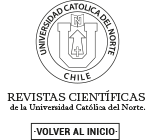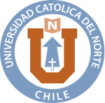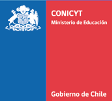Presentation. New capitalisms and territorial transformations in the Andean region
DOI:
https://doi.org/10.22199/issn.0718-1043-2019-0033Keywords:
territory, extractivism, developmentalist policies, capitalismsAbstract
This presentation introduces a special issue that analyzes the new territorial configurations taking shape in the Andean region under the developmentalist governments of the 21st century. The new territorial projects seek to increase the extraction of resources, the transference of crucial products on local level, and economic development. This remodeling transforms the techno-natural, cultural and political orders and creates new ‘capitalisms’ that facilitate knowledge production on, exploitation of, and control over local societies. This special issue analyzes the practical and political expressions of these new forms of social and ecological (re)territorialization.
References
Acosta, A. (2012). Extractivism and Neoextractivism: Two Sides of the Same Curse. En Lang, M. y Mokrani, D. (Eds.). Beyond Development: Alternative Visions from Latin America. Quito: TNI/Rosa Luxemburg Foundation
Acosta, A., Cuvi, J., Ospina, P., Unda, M., Torre, C. de la, Villagómez, G., … Machado, D. (2013). El correísmo al desnudo (segunda edición). Quito.
Agnew, J. y Oslender, U. (2013) Overlapping territories, sovereignty in dispute. En Nicholls, W. y Miller, B. (Eds.). Spaces of Contention: Spatialities and Social Movements. Londres: Ashgate.
Arellano-Yanguas, J. (2011). Aggravating the resource curse: Decentralisation, Conflict and Mining in Peru. Journal of Development Studies, 47(4), 617-638.
Arroyo, A. y Boelens, R. (Eds.) (2013). Aguas Robadas. Despojo hídrico y movilización social. Alianza Justicia Hídrica. Quito: Abya-Yala.
Ayala Mora, E. (2011). Del Neoliberalismo al ‘Socialismo del Siglo XXI’. Buenos Aires: Universidad de Buenos Aires.
Ballard, C. y Banks, G. (2003). Resource Wars: The Anthropology of Mining. Annual Review of Anthropology, 32, 287-313.
Baud, M. (2009). Indigenous Politics and the State: The Andean Highlands in the Nineteenth and Twentieth Centuries. En Fischer, E. F. (Ed.). Indigenous Peoples, Civil Society, and the Neo-Liberal State in Latin America. Nueva York y Oxford: Berghahn.
Baud, M., de Castro, F. y Hogenboom, B. (2011). Environmental Governance in Latin America: Towards an Integrative Research Agenda. European Review of Latin American and Caribbean Studies, 90, 78-88.
Bebbington, A. (Ed.) (2007). Una ecología política de la minería moderna: movimientos sociales, empresas y desarrollo territorial. Lima: Instituto de Estudios Peruanos.
Bebbington, A. (2009) Latin America: Contesting extraction, producing geographies. Singapore Journal of Tropical Agriculture, 30, 7-12.
Bebbington, A. (2012). Underground political ecologies: The second Annual Lecture of the Cultural and Political Ecology Specialty Group of the Association of American Geographers. Geoforum, 43(6), 1152-62.
Bebbington, A. y Humphreys-Bebbington, D. (2010). An Andean Avatar: Post-Neoliberal and Neoliberal Strategies for Securing the Unobtainable. New Political Economy, 16(1), 131-145.
Bebbington, A., Humphreys-Bebbington, D. y Bury, J. (2010). Federating and Defending: Water, Territory and Extraction in the Andes. En Boelens, R., Getches, D. y Guevara, A. (Eds.). Out of the Mainstream: Water Rights, Politics and Identity. Londres y Washington: Earthscan.
Boelens, R. (2014). Cultural politics and the hydrosocial cycle: Water, power and identity in the Andean highlands, Geoforum, 57, 234-247.
Boelens, R., Hoogesteger, J. y Rodríguez-de-Francisco, J. C. (2014). Commoditizing Water Territories: The clash between Andean water rights cultures and Payment for Environmental Services policies. Capitalism Nature Socialism, 25(3), 84-102.
Boelens, R., Hoogesteger, J. y Baud, M. (2015). Water reform governmentality in Ecuador: neoliberalism, centralization and the restraining of polycentric authority and community rule-making. Geoforum, 64, 281-291.
Boelens, R., Hoogesteger, J., Swyngedouw, E., Vos, J. y Wester, P. (2016). Hydrosocial territories: a political ecology perspective. Water International, 41(1), 1-14.
Bridge, G. y Perreault, T. (2009). Environmental governance. En Catree, N. et al. (Eds.). Companion to environmental geography. Oxford: Blackwell.
Budds, J. (2008). Whose scarcity? The hydrosocial cycle and the changing waterscape of La Ligua River Basin, Chile. En Goodman, M., Boykoff, M. y Evered, K. (Eds.). Contentious Geographies: Environmental Knowledge, Meaning, Scale. Aldershot: Ashgate Publishing.
Budds, J. (2010). Water Rights, Mining and Indigenous Groups in Chile’s Atacama. En Boelens, R., Getches, D. y Guevara, A. (Eds.). Out of the Mainstream. Water Rights, Politics and Identity. Londres y Washington: Earthscan.
Burneo, M. L. y Chaparro, A. (2010). Poder, comunidades campesinas e industria minera: el gobierno comunal y el acceso a los recursos en el caso de Michiquillay. Anthropologica, 28, 85-110.
Büscher, B. y Fletcher, R. (2015). Accumulation by Conservation. New Political Economy, 20(2), 273-298.
Cameron, M. y Sharpe, K. E. (2010). Andean left turns: Constituent power and constitution- making. En Cameron M. y Heshberg, E. (Eds.). Latin American Left Turns: Politics, Policies and Trajectories of Change. Boulder: Lynne Rienner Publishers.
Castree, N. (2008). Neoliberalising nature: The logics of deregulation and reregulation. Environment and Planning, 40(1), 131-152.
Damonte, G. (2008). The Constitution of Political Actors in the Andes. Berlín: VDM Verlag.
Damonte, G. (2015). Redefiniendo territorios hidrosociales: control hídrico en el valle de Ica, Perú (1993-2013). Cuadernos de Desarrollo Rural, 12(76), 109-133.
Damonte, G. y Peralta, J. A. (2015). Extracción y naturaleza: agricultura y minería a gran escala. En Henríquez, N., Damonte, G., Braig, M. y Göbel, B. (Eds.). Desigualdades en un mundo globalizado. Lima: CISEPA PUCP.
Dávalos, P. y Albuja, V. (2014). Ecuador: Extractivist dynamics, politics and discourse. En Veltmeyer, H. y Petras, J. (Eds.). The New Extractivism. London: Zed Books.
De Castro, F., Van Dijck, P. y Hogenboom, B. (2014). The Extraction and Conservation of Natural Resources in South America. Cuadernos CEDLA 27. Ámsterdam: CEDLA.
De Castro, F., Hogenboom, B. y Baud, M. (2015). Gobernanza ambiental en América Latina. Buenos Aires: CLACSO.
Duarte-Abadía, B. y Boelens, R. (2016) Disputes over territorial boundaries and diverging valuation languages: the Santurban hydrosocial highlands territory in Colombia. Water International, 41(1), 15-36.
Duarte-Abadía, B., Boelens, R. y Roa-Avendaño, T. (2015). Hydropower, encroachment and the repatterning of hydrosocial territory: The case of Hidrosogamoso in Colombia. Human Organization, 74(3), 243-254.
Escobar, A. (2009). Latin America at a crossroads. Alternative modernizations, post-liberalism, or post-development? Cultural Studies, 24, 1-61.
Ferguson, J., y Gupta, A. (2002) Spatializing states: Toward an ethnography of neoliberal governmentality. American Ethnologist, 29(4), 981-1002.
Fletcher R. (2010). Neoliberal environmentality: Towards a poststructuralist political ecology of the conservation debate. Conservation & Society, 8, 171-81.
Foucault, M. (1991). Governmentality. En Burchell, G., Gordon, C. y Miller, P. (Eds.). The Foucault Effect: Studies in governmentality. Chicago: University of Chicago Press.
Foucault, M. (2006). Seguridad, territorio, población. Curso en el Collège de France (1977-1978). Buenos Aires: Fondo de Cultura Económica.
Foucault, M. (2008). The Birth of Biopolitics. Nueva York: Macmillan.
Gaybor, A. (2011). Acumulación en el campo y despojo del agua en el Ecuador. En Boelens, R., Cremers, L. y Zwarteveen, M. (Eds.). Justicia Hídrica: Acumulación, Conflicto y Acción Social. Lima: IEP.
Gil, V. (2009). Aterrizaje minero: cultura, conflicto, negociaciones y lecciones para el Desarrollo desde la minería en Ancash. Lima: Instituto de Estudios Peruanos.
Göbel, B., y Ulloa, A. (Eds.) (2014). Extractivismo minero en Colombia y América Latina. Bogotá: Universidad Nacional de Colombia – Ibero-Amerikanisches Institut – DesiguAldades.net.
Gudynas, E. (2011). Camino para las transiciones post extractivistas. En Alayza A. y Gudynas, E. (Eds.). Transiciones: Post extractivismo y alternativas al extractivismo en el Perú. Lima: RedGE, CEPES.
Gudynas, E. (2013). Extracciones, Extractivismos y Extrahecciones. Un marco conceptual sobre la apropiación de los recursos naturales. CLAES, Observatorio del Desarrollo, 18, 1-17.
Harvey, D. (1996). Justice, Nature y the Geography of Difference. Cambridge y Oxford: Blackwell Publishers.
Heynen, N., McCarthy, J., Prudham, S. y Robbins, P. (2007). Neoliberal environments. False promises and unnatural consequences. Nueva York: Routledge.
Hidalgo, J. P., Boelens, R. e Isch, É. (2017). The Daule-Peripa Multipurpose Hydraulic Scheme: technocratic reconfiguration of a hydro-social territory and dispossession in coastal Ecuador. Latin American Research Review (en proceso).
Hogenboom, B. (2012). Depoliticized and Repolitiziced Minerals in Latin America. Journal of Developing Societies, 28(2), 133-158.
Hogenboom, B. (2015). New elites around South America’s strategic resources. En Bull, B. y Aguilar-Stoen, M. (Eds.). Environmental politics in Latin America: Elite dynamics, the left tide and sustainable development. Londres y Nueva York: Routledge.
Hommes, L. y Boelens, R. (2017) Urbanizing rural waters: Rural-urban water transfers and the reconfiguration of hydrosocial territories in Lima. Political Geography, 57, 71-80.
Hoogesteger, J. y Verzijl, A. (2015) Grassroots scalar politics: Insights from peasant water struggles in the Ecuadorian and Peruvian Andes. Geoforum, 62, 13-23.
Hoogesteger, J., Boelens, R. y Baud, M. (2016). Territorial pluralism: water users’ multi-scalar struggles against state ordering in Ecuador’s highlands. Water International, 41(1), 91-106.
Isch, É., Peña, F. y Boelens, R. (Eds.). (2012). Agua, Injusticia y Conflictos. Cusco: CBC.
Lu, F., Valdivia, G. y Silva, N. L. (2017). Oil, Revolution, and Indigenous Citizenship in Ecuadorian Amazonia. Londres: Palgrave Macmillan.
Lucero, J. A. (2008). Struggles of Voice. The Politics of Indigenous Representation in the Andes. Pittsburgh: University of Pittsburgh Press.
Lynch B. D. (2012). Vulnerabilities, competition and rights in a context of climate change toward equitable water governance in Peru’s Rio Santa Valley. Global Environmental Change, 22, 364-373.
Marston, S. (2000). The social construction of scale. Progress in Human Geography, 24(2), 219-242.
McCarthy, J. y Prudham, S. (2004). Neoliberal nature and the nature of neoliberalism. Geoforum, 35, 275-283.
Mena-Vásconez, P., Boelens, R. y Vos, J. (2016). Food or flowers? Contested transformations of community food security and water use priorities under new legal and market regimes in Ecuador's highlands. Journal of Rural Studies, 44, 227-238.
Ortiz, A. (2015). Taking Control of the Public Sphere by Manipulating Civil Society: The Citizen Revolution in Ecuador. ERLACS, 98, 29-48.
Paerregaard, K., Bredholt Stensrud, A. y Oberborbeck, A. (2016). Water citizenship. Negotiating water rights and contesting water culture in the Peruvian Andes. Latin American Research Review, 51(1), 198-217.
Perreault, T. (2014) Minería, Agua y Justicia Social en los Andes: Experiencias Comparativas de Perú y Bolivia. Cusco: Centro Bartolomé de Las Casas/La Paz: PIEB.
Perreault, T. (2015). Performing Participation: Mining, Power, and the Limits of Public Consultation in Bolivia. The Journal of Latin American and Caribbean Anthropology, 20(3), 433-451.
Ploeg, J.D. van der (2008). The New Peasantries. Struggles for Autonomy and Sustainability in an Era of Empire and Globalization. Londres: Earthscan.
Radcliffe, S. (2011). Development for a postneoliberal era? Sumak Kawsay, living well and limits to decolonization in Ecuador. Geoforum, 43, 240-249.
Roa-García, M. C. (2014). Equity, efficiency and sustainability in water allocation in the Andes: Trade-offs in a full world. Water Alternatives, 7(2), 298-319.
Rodríguez-de-Francisco, J. C. y Boelens, R. (2015). Payment for environmental services: mobilising an epistemic community to construct dominant policy. Environmental Politics, 24(3), 481-500.
Rodríguez-de-Francisco, J. C. y Boelens, R. (2016). PES hydrosocial territories: de-territorialization and re-patterning of water control arenas in the Andean highlands. Water International, 41(1), 140-156.
Sack, R. D. (1983). Human Territorialty: A Theory. Annals of the Association of American Geographers, 73, 55-74.
Salas, G. (2008). Dinámica social y minería. Familias pastoras de puna y la presencia del proyecto Antamina (1997-2002). Lima: Instituto de Estudios Peruanos.
Schillling-Vacaflor, A. (2016). Who controls the territory and the resources? Free, prior and informed consent (FPIC) as a contested human rights practice in Bolivia. Third World Quarterly, 1-17.
Schlosberg, D. (2004). Reconceiving environmental justice: global movements and political theories. Environmental Politics, 13(3), 517-540.
Smith, N. 1984. Uneven development: nature, capital and the production of space. Oxford and Cambridge, MA: Blackwell.
Sullivan, S. (2009). Green capitalism, and the cultural poverty of constructing nature as service provider. Radical Antropology, 3, 18-27.
Svampa, M. (2013). “Consenso de los Commodities” y lenguajes de valoración en América Latina. Nueva Sociedad, 244, marzo-abril.
Swyngedouw, E. (2004). Globalisation or ‘glocalisation’? Networks, territories and rescaling. Cambridge Review of International Affairs, 17(1), 25-48.
Swyngedouw, E. y Boelens, R. (2017) “…And Not A Single Injustice Remains”. Hydro-Territorial Colonization and Techno-Political Transformations in Spain. En Boelens, R., Perreault, T. y Vos. J. (Eds.). Water Justice. Cambridge, MA: Cambridge University Press (en proceso).
Teijlingen, K. van (2017). The ‘will to improve’ at the mining frontier: Neo-extractivism, development and governmentality in the Ecuadorian Amazon. The Extractive Industries and Society, DOI:10.1016/j.exis.2016.10.009.
Terhorst, P., Olivera, M. y Dwinell, A. (2013). Social movements, left governments and the limits of water sector reform in Latin America’s left turn. Latin American Perspectives, 40(4), 55-69.
Urteaga, P. (2014). Creadores de paisajes hídricos. Abundancia de agua, discursos y mercado en las cuencas de Ica y Pampas. En Oré. M. T. y Damonte, G. (Eds.). ¿Escasez de agua? Retos para la gestión de la cuenca del río Ica. Lima: PUCP.
Van Cott, D. L. (2000). The Friendly Liquidation of the Past. The Politics of Diversity in Latin America. Pittsburgh: University of Pittsburgh Press.
Wilson, J., Bayón, M. y Diez, H. (2015). Post-Neoliberalism and Planetary Urbanization in the Ecuadorian Amazon. Quito: Instituto de Altos Estudios Nacionales.
Yacoub, C., Duarte, B. y Boelens, R. (Eds.) (2015). Despojo del Agua y Ecología Política. Hidroeléctricas, industrias extractivas y agro-exportación en Latino América. Quito: Abya-Yala.
Zwarteveen, M. y Boelens, R. (2014). Defining, researching and struggling for water justice: Some conceptual building blocks for research and action. Water International, 39(2), 143-158.
Published
How to Cite
Issue
Section

All works published in Revista Estudios Atacameños (ISSN on line:0718-1043) Revista Estudios Atacameños Creative Commons International 4.0 attribution (CC BY 4.0) licence.
Authors remain the owners of their work and may republish their articles elsewhere without having to request permission, as long as they indicate that the work was originally published in Revista Estudios Atacameños (ISSN on liine:0718-1043).

















